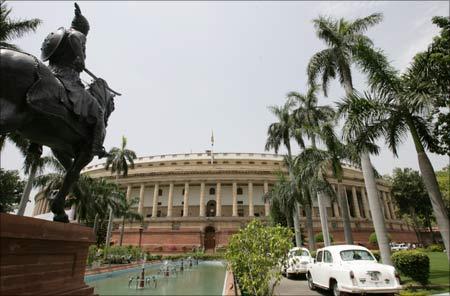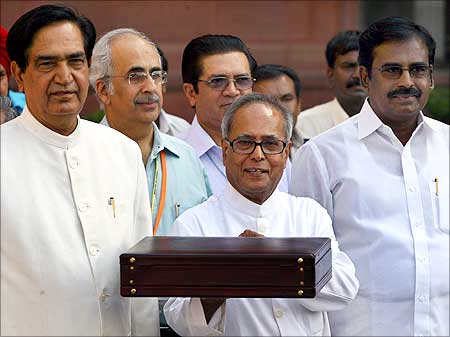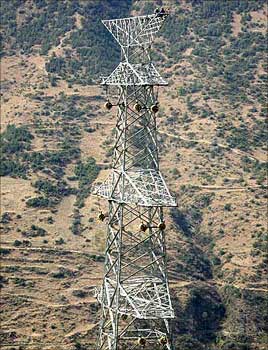 | « Back to article | Print this article |
Divestment: India's new financial mantra
Presenting the Union Budget in Parliament on July 6, Finance Minister Pranab Mukherjee proposed estimated divestment proceeds of Rs 1,120 crore for 2009-10, while only a few days before that the Economic Survey had suggested that the government needed to raise Rs 25,000 crore every year by divesting its stake in state-run companies.
The response to depressing announcement in the Budget was swift and sharp: the stock market fell like a stone and lost 869 points and hundreds of crores of rupees in investor wealth.
"Public sector undertakings are the wealth of the nation, and part of this wealth should rest in the hands of the people. While retaining at least 51 per cent government equity in our enterprises, I propose to encourage people's participation in out divestment programme," the finance minister had said.
Two days after the Budget, the market however started to recover as buzz of divestment began to do the rounds. It was thought that the finance minister had tactically kept divestment a low-key affair in his Budget proposals so as to keep trade unions and others who oppose divestment of PSUs at bay.
The talk currently is that investors could look forward to divestment in NMDC (earlier known as National Mineral Development Corporation), Rail India Technical and Economic Services, Cochin Shipyard Ltd, Manganese Ore India Ltd, Telecommunications Consultants India Ltd, Rashtriya Ispat Nigam Ltd, Satluj Jal Vidyut Nigam Ltd and some other public sector enterprises.
But just what is divestment?
In finance and economics, divestment or divestiture, is the opposite of investment. It means reduction of some kind of asset for either financial or ethical objectives. In this particular case, it refers to the government diluting its stake in some public sector companies, since the argument has for long been that governments should be in the business of administration and not in the business of business.
Divestment: India's new financial mantra
Will planned divestment benefit India?
According to analysts, India's recent plans to sell stakes in state-owned enterprises would help it address many of India's existing economic concerns and alleviate the current 'fiscal stress'.
"As the authorities are severely cash-strapped -- with large fiscal deficits and public debt in recent years, proceeds from divestment can help to soothe the current fiscal stress," Moody's economy.com said.
Although divestment is not a long-term source of funding, it could provide a much-needed relief to the government Budget during the extraordinary global downturn that had forced policymakers to increase expenditure to sustain economic momentum, said analysts.
And the biggest gain may be an improvement in corporate governance.
Divestment: India's new financial mantra
What does the government have to say?
The finance ministry said recently that the divestment programme will kick off with the dilution of government equity in listed entities, where public holding is less.
However, Finance Secretary Ashok Chawla, in a recent interview, ruled out using the proceeds of divestment to finance fiscal deficit, even as it is expected to widen to about 18-year high of 6.8 per cent of GDP this fiscal.
"Basically, we will first go with the companies which are listed and where stocks in public float is much less -- 2 per cent, 5 per cent, etc. There is scope for that to increase," Chawla said.
There are at least 12 listed public sector units where public shareholding is less than 10 per cent. They include companies like NMDC, MMTC, Neyveli Lignite, Hindustan Copper. However, Chawla did not name the companies where divestment process could start.Divestment: India's new financial mantra
Asked about the amount government aims to raise from divestment, Chawla said, numbers cannot be fixed as yet since these are only preliminary discussions.
"Now what will finally be agreed to? What will the Cabinet approve? What percentage? When it will happen? What will be the market price? That will determine the amount which is a function of number of shares and market price. So, there cannot be a maximum target per se," the finance secretary said.
Chawla indicated that the advise given by the Economic Survey about raising Rs 25,000 crore (Rs 250 billion) from divestment every year might not happen this fiscal.
"What the Economic Survey says you should look at Rs 25,000 crore a year, but that may or may not happen every year. In the current year already four months or so have gone. There is time process, through which these companies have to go, so therefore for the current year it is very difficult to say what the amount will be," Chawla said.
He also said the proceeds from divestment will not be used to fund widening fiscal deficit. "The amount will not be used for to finance fiscal deficit, it would be used for high priority social sector programmes," he said.
There were speculations that the government may use part of the proceeds to finance fiscal deficit, but currently the proceeds go to the National Investment Fund, norms of which do not allow this.
Asked whether NIF norms will be changed, Chawla said, "That I can't say. The Cabinet will decide that. But, either way whether it is spent through NIF or otherwise, it will be spent on flagship social sector programmes," he said.
So let us take a look at some of the PSUs whose IPOs are expected to hit the market in recent future. . .
Divestment: India's new financial mantra
Oil India Limited
Oil India Ltd may hit the market with an initial public offering on September 7. "As per the tentative schedule drawn, the IPO may open for public subscription on September 7 and will close on September 11," a petroleum ministry official said.
OIL, which produces 3.5 million tonnes a year of oil, will offer 2.64 crore equity shares to public in the IPO, while the government will simultaneously sell 10 per cent of its stake in the company to state refiners.
Post-IPO and disinvestment, the government's stake in the company will decrease from 98.13 per cent to 78.5 per cent.
The official said the IPO proceeds would be used to fund capex requirement for 2009-10 and 2010-11 when it had planned Rs 2,300 crore and Rs 2,400 crore expenditure, respectively.Divestment: India's new financial mantra
OIL has started discussions with bankers, including HSBC Securities & Capital Markets, JM Financial Ltd, Citigroup Global Market India and Morgan Stanley India for the IPO.
OIL was to launch its IPO of 11 per cent equity shares on November 10, 2008, but the reversal of fortunes on the stock markets led to the deferment of the plan.
Alongside the IPO, government is to sell 10 per cent of its current holdings in OIL to Indian Oil Corporation, Hindustan Petroleum and Bharat Petroleum.
IOC will get 5 per cent while HPCL and BPCL would take 2.5 per cent shares each.
Divestment: India's new financial mantra
Bharat Heavy Electricals Ltd
BHEL said recently that it was sitting on comfortable cash reserves but if the government is keen on an FPO to raise money it could be done in the next financial year.
"We are a cash-surplus company, but if the government wants to bring out a follow-on public offer, they can, but I think only in the next financial year," BHEL chairman and managing director K Ravi Kumar had said.
The government, at present, holds a 67.72 per cent equity stake in BHEL, which would come down to 57.72 per cent if it divests 10 per cent equity.
Minister of Heavy Industries and Public Enterprises Vilasrao Deshmukh had earlier said that the point of divestment in the company is still under consideration.
As a part of its 100-day agenda, BHEL would enter into an agreement with the Indian Railways for supply of stainless steel EMU coaches on a long-term basis.
It would synchronise eight thermal and hydro sets to generate 1,200 MW capacity.
The company would synchronise five captive power plants totalling 228 MW of capacity as a part of its 100-day agenda. Kumar said that the company has received orders worth Rs 10,000 crore during the April-June quarter.
Divestment: India's new financial mantra
NHPC
The initial public offer of National Hydroelectric Power Corporation Ltd to raise Rs 1,680 crore is likely to hit the market on August 7.
"If everything goes well the initial public offer is likely in the first week of August, tentatively August 7," NHPC chairman and managing director S K Garg had said recently.
NHPC would infuse 10 per cent fresh equity through this public offer to raise Rs 1,680 crore, while the government will divest its five per cent stake in the company.
It would come up with 168 crore shares of face value of Rs 10 each, which would be offered at a premium through book building process.
As per the Securities and Exchange Board of India listing norms, independent directors should form 50 per cent of the board which is headed by executive chairman. To meet this criteria, NHPC should have seven independent directors on board before it can go to the market.
The company filed the draft red herring prospectus with market regulator Sebi on August 6, 2008.
NHPC had also filed for DRHP in April 2007 but was not given permission by the market regulator as the company did not have the required strength of non-official directors on board, which it now has.
Divestment: India's new financial mantra
BSNL and TCIL
The government believes the listing of Bharat Sanchar Nigam Ltd and Telecommunications Consultants India Ltd would help improve the company's image and promote its growth.
"Two of our companies BSNL and TCIL are not yet listed. We would like to list them with 10 per cent divestment in each of them initially. But the timeline will be decided in consultation with the finance ministry," Telecom Secretary Siddharth Behura said.
BSNL sources said there will not be any fresh equity, but only offloading by the government. The company will not get any proceeds from the IPO.
BSNL's net profit has hit a low of Rs 104 crore on revenue of Rs 34,937 crore, both down from a year earlier, hit by higher staff costs and declining income from services.
The government had planned to sell 10 per cent of BSNL and list its shares last year, but had to defer the proposal after opposition from a major workers union and the stock market meltdown.
TCIL's CMD Rakesh Upadhyay said whatever decision the government takes, the PSU will abide by it. No valuation had been done yet, he said, but the listing would be good for the company.Divestment: India's new financial mantra
Opposition to divestment
The BSNL union has, meanwhile, decided to observe an 'anti-divestment day' on July 22 protesting the government's plan to sell its shareholding in the company.
"The plea of the management that IPO is necessary to mop up funds for development and expansion is far from the truth, as the BSNL has more than Rs 37,000 crore (Rs 370 billion) stashed in banks. It can be used for expansion instead of selling shares," V A N Namboodiri, convenor, joint forum of BSNL Associations, said in a statement.
The Joint Forum of BSNL Employees Association/Unions of Executives and Non-executives has said it would be sending telegrams to Prime Minister Manmohan Singh and Telecom Minister A Raja demanding dropping the IPO and disinvestment proposal, the statement said.









